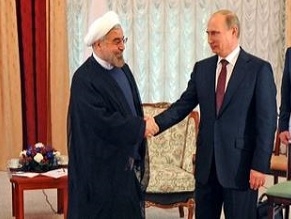|
Analytics

Putin and Rouhani shake hands. Photo: REUTERS
|
Following US-Russian agreement, Iran will aim for a deal of its own
18.09.2013 Following US President Barack Obama’s acceptance of a Russian-initiated deal to prevent an attack on Syria, Tehran now seems to be eager for a deal of its own. A flurry of reports over the past few days show Iranian leaders speaking of compromise.
Witnessing how easily and quickly Russia was able to mediate a political solution that avoided Western intervention, Iran must be thinking that it can have its cake and eat it too. If it is willing to reach a sizable compromise on some aspects of its nuclear program, without totally dismantling it, then it may be possible not only to put off a US attack, but also to decrease sanctions.
And even if the US balks at a deal, Tehran can use the negotiating time to increase the pressure by further advancing or acquiring a nuclear weapon.
The German website Spiegel Online, quoting unidentified intelligence sources, reported that the new Iranian president, Hassan Rouhani, is about to propose a deal that includes closing down the Fordo enrichment plant and allowing international inspectors to observe the removal of centrifuges.
This comes on top of news that Rouhani has been exchanging letters with Obama.
Meanwhile, Iran’s new nuclear energy chief has pledged increased cooperation with the International Atomic Energy Agency ahead of upcoming talks later this month.
Even Supreme Leader Ayatollah Ali Khamenei has said that he believes in “heroic flexibility,” according to a report by the Iranian Fars News Agency on Tuesday.
“I agree with the issue that I called ‘heroic flexibility’ some years ago, since this move is highly good and necessary on certain occasions, but with commitment to one main condition,” he said. Khamenei added, “A technical wrestler also shows flexibility for technical reasons sometimes, but he would never forget who his rival is and what his main goal is.”
So it seems “tactical flexibility” means to serve the strategic goal of achieving nuclear weapons in order to gain power and secure the regime against attack.
Prof. Meir Litvak of the department of Middle Eastern history and the director for the Alliance Center of Iranian Studies at Tel Aviv University, told The Jerusalem Post it was clear that “Rouhani is trying to improve Iran’s relations with the West because he must relieve the economic pressure on Iran.”
However, there remain some open questions, he said, noting that it was unclear how much leeway Rouhani had. “How far will Khamenei, the conservatives and the Republican Guards allow him to go?”
Litvak went on to add that if Iran were to continue its nuclear activities at their other sites besides Fordo, the value of closing Fordo would be limited.
In any case, he said there were ways Iran might still be able to develop its nuclear capabilities.
Taking a more optimistic view, Trita Parsi, the president of the National Iranian American Council told the Post, “If these reports are true, then it is very significant because the closure of Fordo has been a central Western objective and the Iranians have thus far shown no sign of flexibility on Fordo.”
“Rouhani is trying to get the world’s attention to infuse new confidence in the negotiations, and with this proposal, he will likely succeed,” Parsi said, adding that “the West should study this carefully, because rejecting it out of hand will make Tehran look flexible and the West intransigent.”
Prof. Ali Ansari of St. Andrews University in Scotland, the founding director of the Institute for Iranian Studies, concurred with Litvak, telling the Post that “Rouhani takes over the reins of government at a time when Iran faces unprecedented political and economic problems.”
Ansari said that Rouhani’s priority “is to place the economy back on a firm footing; and within this parameter his first task is to prevent, and if possible reverse, the sanctions that have been imposed on Iran over the last few years.”
"The first stage of this process is to redefine Iran's image abroad, not an enormously difficult task given the exceedingly low bar left by his predecessor [Mahmoud Ahmadinejad]. At the same time, the damage to Iran's international reputation is very real and it will take serious substance rather than form for his strategy to succeed," he added.
By ARIEL BEN SOLOMON
JPost.com
|
|
